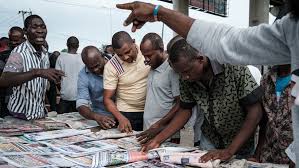The report that Nigeria is set to receive a $1.05bn syndicated loan backed by oil from the African Import Export Bank next month is one of the trending stories in Nigerian newspapers on Tuesday.
The Punch reports that Nigeria is set to receive a $1.05bn syndicated loan backed by oil from the African Import Export Bank next month.
The loan is part of a larger $3.3bn prepayment facility arranged by Afreximbank, with repayment terms tied to crude cargoes from the Nigerian National Petroleum Company Ltd.
According to Bloomberg, Afreximbank’s Senior Executive Vice President for Finance, Administration, and Banking, Denys Denya, confirmed the verification of crude availability, paving the way for the final release of the balance within the next month.
The loan aims at reviving Nigeria’s economy and enhancing the supply of hard currency in the local foreign exchange market. A substantial portion of it — two-thirds, was already disbursed in January.
This financial maneuver is designed to provide Nigeria with immediate funds based on future oil production, offering a lifeline to the country’s struggling economy.
The Nigerian National Petroleum Company Limited, had in January said it would prepay future royalties and taxes to the Federal Government from the $3.3bn financing deal it got from African Export-Import Bank last year.
The newspaper says that some electricity distribution companies have continued to blame technical faults and other challenges for their inability to supply 20-hour power to customers on Band A feeders.
The DisCos on their various social media platforms had appealed to the customers in Band A, seeking their understanding for their failure to meet up with the required minimum service level.
The Benin Electricity Distribution Company apologised to its customers on about 13 Band A feeders for not being able to supply them with up to 20 hours of electricity as directed by the Nigerian Electricity Regulatory Commission.
The NERC, after announcing that customers of Band A feeders would now pay N225/KWh instead of N68KWh, said it was mandatory that the customers who were no longer enjoying subsidies must get a minimum of 20 hours of electricity daily.
The NERC warned that Band A feeders not supplying up to 20 hours per day would eventually be downgraded to other bands according to the hours of power supply.
BEDC also blamed power outages on load shedding by the Transmission Company of Nigeria.
On Monday, the Kano DisCo apologised to Band A 33KV Gaskiya feeder customers, saying there was a circuit breaker issue.
The Vanguard newspaper reports that the World Bank has projected that growth will rebound in African economies from 2.6 per cent in 2023 to 3.4 per cent in 2024 and 3.8 per cent in 2025.
This is contained in a statement issued by the World Bank on its latest Africa’s Pulse Report, released on Tuesday.
The report said increased private consumption and declining inflation were supporting an economic rebound in Sub-Saharan Africa.
It, however, said the recovery remained fragile due to uncertain global economic conditions, growing debt service obligations, frequent natural disasters, and escalating conflict and violence.
“However, this recovery remains tenuous. While inflation is cooling across most economies, falling from a median of 7.1 to 5.1 per cent in 2024, it remains high compared to pre-COVID-19 pandemic levels.
“Additionally, while growth of public debt is slowing, more than half of African governments grapple with external liquidity problems and face unsustainable debt burdens.
“Overall, the report underscores that in spite of the projected boost in growth, the pace of economic expansion in the region remains below the growth rate of the previous decade (2000–2014).
“This is insufficient to have a significant effect on poverty reduction.
“Moreover, due to multiple factors, including structural inequality, economic growth reduces poverty in Sub-Saharan Africa less than in other regions.”
The report said transformative policies were needed to address deep-rooted inequality, sustain long-term growth, and effectively reduce poverty.
The newspaper says that in wake of the recent hike in electricity tariff for customers in Band A, the Nigerian Society of Engineers, NSE, has called for stiff sanctions on electricity distribution companies, DisCos, which fail to meet the minimum 20 hours of supply to the customers.
The Nigerian Electricity Regulatory Commission (NERC) had last week raised tariff for customers in Band A from N68/kWh to N225kWh leading to outcry by the affected customers. But the government defended the decision saying it would lead to improved power supply by attracting investment to the sector.
The Commission also imposed a N200 million fine on the Abuja Electricity Distribution Company, AEDC, for increasing the tariff of customers in other bands not affected by the tariff hike.
Speaking to journalists in Abuja on Monday, the President, NSE, Mrs. Margaret Oguntala, explained that while the society was not against the tariff increase, customers must be protected with meters provided for those in the category.
Mrs. Oguntala insisted that the policy must be implemented in a transparent and accountable manner that ensures that customers are not short-changed.
According to her, “policies are made but what is the framework for implementing these policies? How effective are they in the long run? If there are no sanctions for the DisCos and you claim to be giving someone in Band A 20 hours of supply but you are not actually doing so, what happens?
“We are saying that there must be sanctions for defaults and do you do that? Where there are shortfalls, the DisCos must be held responsible which means that the metering must be very transparent. We have asked the question of what will happen during downtime when there are repairs? All these must be put into consideration for the policy to work,” she added.
GIK/APA
Nigeria: Press zooms in on new date for Afreximbank’s loan of $1bn, others

Previous ArticleSouth Africa welcomes UN resolution on Gaza conflict

